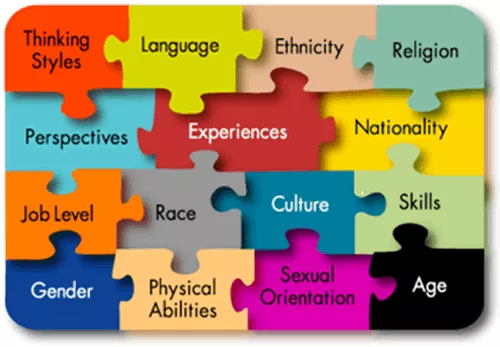July
|
HR InTouchThe Monthly Newsletter of the Greater Madison Area SHRM |
|||||||||||||||||||||||||||||||||||||||||||||||||||||||||||||||||||||||||||||||||||||||||||||||||
In This EditionPresident's Message
Not Every Termination Following a Discrimination Complaint Constitutes Retaliation Professional Development and Events Our Next Professional Development Summits Meet, Greet, & Eat - In Person! 4 Steps to Avoid Micromanagement in Remote Work Volunteering in GMA SHRM Compensation & Benefits The War for Talent Workforce Readiness, Diversity & Inclusion Navigating Adversity to Your DEI & Belonging Efforts Volunteer Opportunity - Resume Reviews and Interview Preparation Helpful Link from Wisconsin DWD: - Wisconsin Family and Medical Leave Act Diversity Observances in July
Newsletter Coordinator Opportunity! Welcome New Members!
|
Let’s get this party started, ya’ll! Government Affairs & Legal Updates Not Every Termination Following a Discrimination Complaint Constitutes Retaliation
|
|||||||||||||||||||||||||||||||||||||||||||||||||||||||||||||||||||||||||||||||||||||||||||||||||
Brian P. Goodman |
 Sarah J. Horner  Storm Larson |
 State and federal law prohibits employers from retaliating against employees for filing a complaint or opposing discrimination in the workplace. A recent decision from the Third Circuit Court of Appeals provides a good example of when employers need not refrain from terminating employees to avoid retaliation lawsuits. Sometimes, termination is necessary and legitimate, notwithstanding prior complaints of, or opposition to, discrimination in the workplace.
State and federal law prohibits employers from retaliating against employees for filing a complaint or opposing discrimination in the workplace. A recent decision from the Third Circuit Court of Appeals provides a good example of when employers need not refrain from terminating employees to avoid retaliation lawsuits. Sometimes, termination is necessary and legitimate, notwithstanding prior complaints of, or opposition to, discrimination in the workplace.
In Duong v. Benihana National Corporation, a chef at a Benihana restaurant made several complaints to his supervisors regarding a server who repeatedly sexually harassed another employee. After one of the incidents of alleged sexual harassment, the chef and server started arguing, and the interaction escalated to physical violence. Benihana subsequently terminated the chef for workplace violence and terminated the server for workplace violence and sexual harassment. The chef then sued Benihana for retaliation due to his prior internal complaints of sexual harassment. The court determined that because Benihana had a policy against workplace violence and had terminated the chef for clearly violating that policy (rather than terminating the chef for previously filing complaints of sexual harassment), the termination was legitimate and nonretaliatory.
Duong shows that even if an employee has previously filed complaints of discrimination with an employer, the employer may terminate that employee for a legitimate, nonretaliatory reason. Employees must use the proper channels to report a complaint so the employer can address it. When employees take matters into their own hands and violate workplace policies, they do so at the risk of discipline and termination.
Return to Top
-
August 16, 2022 - Professional Development Summit
Alliant Energy Center
Session 1: Video Best Practices in Recruiting and Onboarding
Session 2: Best Practices and Strategies for Inclusive Benefits
Program Details and Registration
-
September 20, 2022 - Professional Development Summit
Alliant Energy Center
Session 1: Creating a Culture of Productivity: Creating Real Results
Session 2: I Feel Safe – How to Create Thriving Cultures
Program Details and Registration
Return to Top
Meet, Greet & Eat with your fellow GMA SHRM Members!
Share stories, interests and have some laughs over coffee or lunch! A great way to connect, gripe and celebrate with your HR peeps that "get it"!
Details:
July 21 – Noon to 1pm
LJ’s Sports Tavern & Grill, 8 N Paterson Street, Madison
Examples of Micromanaging
First, let’s talk about what micromanaging is not. Managers who micromanage rarely hold animosity or ill will toward the employees they manage. They do not abuse their employees with unprompted negative reviews or resort to public ridicule. Most managers who micromanage don’t even realize they’re doing it because it looks innocent, like this…
Reluctantly, a manager assigns an employee a project. A day or two later, the manager asks for a progress report. They aren’t happy with an “it’s going fine.” They need to know everything done up to that point. The employee spends additional time going over their work and the manager allows the project to continue.
The manager, not happy with the specific way the employee is working, asks to be CC’d on all future communications involving the project. When a decision needs to be made, the manager steps in and insists on being the one to make it. When the project is completed, the manager reviews the work and corrects the mistakes without sharing their changes or solutions with the employee.
The above scenario demonstrates some examples of micromanaging. Next we’ll identify why this practice negatively affects employee motivation and engagement.
Is Micromanaging a Problem?
Yes; micromanaging in the workplace is definitely problematic in the way it makes employees feel and how it impacts their performance. Micromanaging also means that the leader or manager is taking on more than their normal work and that can quickly lead to overwhelm, frustration, and burnout. This holds true whether someone is working onsite or remotely.
We’ve known micromanaging is a problem since 1998 when Harry Chambers published My Way or the Highway: The Micromanagement Survival Guide. A study cited in the text found the following results among workers and managers reporting on micromanagement:
-
Among non-managers:
-
67% indicated they have been previously micromanaged with 37% responding they are currently micromanaged.
-
-
Among managers:
-
71% of managers said they had previously been micromanaged and 27% indicated they were currently being micromanaged.
-
Remote work has only exacerbated the micromanaging problem. The professional network Blind asked 2300 employees whether they have been micromanaged more or less since the pandemic—42% of employees said more. In a study from Track Time 24, findings reported that almost half (48%) of employees believe trust from management has declined and 20% of employees cite micromanagement as the most stressful aspect of working from home. In a 2021 survey of 3000 workers, GoodHire reported that micromanaging was tied for first in being the trait cited as making the worst managers. Micromanaging remote workers has negative effects and is definitely a problem.
The Negative Effects of Micromanaging
Micromanaging is detrimental to the employee, the manager, the company, and clients and customers. Employees feel less empowered and their confidence in their own abilities falls which can lead to decreased employee engagement. Managers become burnt out. The company deals with higher turnover. (Forbes cites that 69% of employees considered changing jobs due to micromanagement and 36% actually changed jobs). The end result might be that clients become dissatisfied with your service.
Why Do Managers Micromanage?
Have you said or thought any of the following?
-
I just like being in the loop.
-
I’ve been here longer so I know how to do it better.
-
I wish I could trust them to do it right.
-
I’m afraid they’ll get it wrong and tank the project.
-
I’d rather not hand off this project, but it looks like I have to.
Thinking along these lines can indicate that a manager micromanages or is on the verge of doing so. But in many cases, it may not be the manager’s leadership style that results in micromanagement. Broader organizational processes and structures must be analyzed to see if the idea of micromanagement is part of the culture and simply labeled as “QR” or “checks and balances.”
How to Avoid Micromanaging Employees
-
Increase Trust in Employees
Without seeing them diligently working at their computer just a few desks over, it can be difficult for managers to trust that their reports are putting in enough effort at home. By increasing general trust in employees, managers will be less tempted to perform copious oversights.
-
Empower Employees
A manager can’t truly show trust in their employees if the manager never lets them make decisions. Empowering employees to make decisions for projects will increase their engagement at work and lead to a greater sense of purpose. Employees with high intrinsic motivation will work harder and managers will not feel the need to micromanage them.
-
Increase Empathy
When a manager steps into an employee’s shoes, they will better understand how and why that person works the way they do. They will better recognize that we are all unique with different thought processes and experiences that drive our actions. Managers with high empathy will micromanage less.
-
Personal and Professional Development
When it comes to learning how to stop micromanaging, personal and professional development courses can help. Whether it’s on-the-job hard skills training or a non-work program to increase soft skills, these courses can help both employees and managers do their jobs better and with more confidence (and less micromanaging).
Cutting down on micromanaging in an organization takes effort and training. Discover the Dale Carnegie Course and our Leadership Courses for Managers today.
We offer coaching on-site or virtual. Give me a call to talk further.
Return to Top
Volunteering in GMA SHRM
Submitted by Carolyn Kuzuhara, State of Wisconsin HR Specialist, GMA SHRM Member, named GMA SHRM’s Volunteer of the Year
 I have been a member of GMA SHRM for 2 years and originally began volunteering in the Volunteer Engagement committee to assist with the Revealed Events. Since then I have also joined the Social Media committee and gotten to work closely with the Board members to put together the newsletter. I wanted to join GMA SHRM because I was new to Human Resources and wanted to be able to learn and grow more in this field, and also network and build connections and relationships with other Human Resource professionals.
I have been a member of GMA SHRM for 2 years and originally began volunteering in the Volunteer Engagement committee to assist with the Revealed Events. Since then I have also joined the Social Media committee and gotten to work closely with the Board members to put together the newsletter. I wanted to join GMA SHRM because I was new to Human Resources and wanted to be able to learn and grow more in this field, and also network and build connections and relationships with other Human Resource professionals.
Throughout my time in GMA SHRM I have met so many inspiring HR professionals and gotten to learn new HR information though all the various events, legal updates, and conferences. I enjoy being a volunteer so I can get to know others better and am always wanting to jump into new roles to help give myself new experiences and opportunities that I can use in my career. Volunteering has given me experience organizing and hosting events, putting together monthly newsletters, enhancing my creativity skills, and speaking in front of larger groups. Being a GMA SHRM volunteer has been beneficial in my career and social life!
The War for Talent
Submitted by Andrew Buss, M3 Employee Benefits Account Executive, GMA SHRM Member
The War for Talent has never been fiercer than it is today. As businesses are coming out of the pandemic, employers continue to feel the effects of the pandemic through their employee populations, work environment, and health care costs.
According to the Bureau of Labor Statistics, the unemployment rate was 4.5% at the end of 2021 with countless job openings that hadn’t been filled. As we come into the second half of 2022 the unemployment rate has dropped to roughly 3.6% which is leading employers to need to become more competitive in their efforts to attract new employees and retain existing talent. The quest to find skilled workers is becoming increasingly competitive with job seekers holding out for better jobs and more meaningful benefits. According to a recent SHRM survey, “36% of employees are willing to change jobs for better benefits.”
Below are a few different strategies that M3 clients are using to boost employee retention:
- Incentivize Loyalty
- Provide Growth Opportunities
- Prioritize Culture and Connection
- Embrace Flexibility
Employers will need to be creative moving forward to continue to attract new employees while working to retain their current staff and ensure that their health care costs remain stable. Below are a few of the different mechanisms M3 is using to help employers contain their health care costs:
- Data Analytics and Healthcare Funding Sources
- Creative Non-Insurance Benefits
- Benefit Plan Design and Competitive Benchmarking
- Building a wellbeing program that addresses the four pillars (Physical, Emotional, Financial, Social)
I would be happy to connect and discuss the War on Talent.
Navigating Adversity to Your DEI & Belonging Efforts
Submitted by Nadine Mobley, Manager, Quality Assurance & Workforce Management and GMA SHRM Diversity Committee Member
 Being an ally is important. It's more than just saying you are okay with LGBTQ. It is being supportive of our legal rights, uplifting LGBTQ voices, and not being fearful to socialize your allyship. Sometimes we experience pushback, where people are in denial "This is not a problem," disengaged "This is not MY problem," derailed "What about other problems?"
Being an ally is important. It's more than just saying you are okay with LGBTQ. It is being supportive of our legal rights, uplifting LGBTQ voices, and not being fearful to socialize your allyship. Sometimes we experience pushback, where people are in denial "This is not a problem," disengaged "This is not MY problem," derailed "What about other problems?"
Some signs of denial include comments like "I don't see color. I am colorblind." or "LGBTQ Allyship didn't exist in our organization until you brought it into conversations." Some signs of disengagement are "I didn't want to say the wrong thing, so I didn't respond." or "We're too busy doing our work, we shouldn't be spending time on this." Some signs of derailing are "Our focus should be on merit and competencies, not on race and gender" or "I don't feel included either, but there’ s no ERG I can join to voice my concerns."
How would you respond to these incidences of denial, derailment and disengagement?
Return to Top
Volunteer Opportunity - Resume Reviews and Interview Preparation
DWD/Job Service is hosting a job fair in Madison on August 24, 2022 from 1pm to 4pm. The job fair will be held at Demetral Park, 506 N 7th Street, Madison. The event will be outdoors, however, we have reserved DWD’s mobile career lab.
There are computers and space inside the mobile lab to work with job seekers. We are looking for volunteers to assist with resume reviews and interview preparation. If you have an hour or so to spare, we would love to have you join us. Please email Jennifer.brikowski@dwd.wisconsin.gov to sign up or learn more.
Monthly Wisconsin Department of Workforce Development - Helpful Links
Wisconsin Family and Medical Leave Act
https://dwd.wisconsin.gov/dwd/publications/erd/pdf/erd-7983-p.pdf
Wisconsin DEPARTMENT OF WORKFORCE DEVELOPMENT -
Return to Top
Diversity Observances in July
Submitted by Mary Vesely, Employee Engagement & Inclusion Manager at Fairway Independent Mortgage Corporation and GMA SHRM Director of Diversity
 Let's have fun, celebrate diversity, learn about each other, and use these observances as themes to engage your team!
Let's have fun, celebrate diversity, learn about each other, and use these observances as themes to engage your team!
- International Non-Binary People’s Day: July 14
- National Parent's Day: July 24
- Disability Independence Day: July 26
Check out this article: 10 Ways to Celebrate Pride Month at the Workplace
DEI Highlights
We’d like to feature member stories to highlight during special observances in upcoming newsletters. If you’d like to share your story on why a diverse observance is important to you, please email Mary Vesely.
Recruitment Guide: Identifying & Interrupting Bias in Hiring
Have you visited our DEI Resources Page? Stay tuned for semi-annual updates on our downloadable document. We welcome any ideas/suggestions.
Return to Top
Newsletter Coordinator Opportunity!
Our committee is looking for a new Newsletter Coordinator! This role coordinates with board members and our administrative team to collate articles into one Word document, then send it to volunteers to review and edit. Our administrative team does the hard work of making it look great, getting online, and sending it out to our members. This very important role is a great way to get involved with GMA SHRM, meet the board members, and give back to the HR community, with a low time commitment.
If you are interested in learning more, please don’t hesitate to reach out to me at sarah.hart@infosecinstitute.com.
Welcome New Members!
| Shawyn | Anderson | Journey Mental Health Center | |
| Kathryn | Benson | SHRM-CP | State of Wisconsin |
| Andrew | Buss | M3 Insurance | |
| ELIZABETH | CHURAS | SHRM-CP | Waunakee Remodeling |
| Karin | Cretney | KL Engineering, Inc. | |
| Paige | Drymalski | Paige Drymalski | |
| Tom | Fox | Connect Search, LLC | |
| Amanda | Fuhrman | SHRM-CP | Wisconsin Reinsurance Corporation |
| Dawna | Furseth | Reach Dane | |
| Amanda | Griffoul | aPHR | Precision Plus |
| Christia | Hunt | PHR, SHRM-CP | State Bank of Cross Plains |
| Rosalyn | Johnson | Quartz Health Solutions | |
| Loren | Kuzuhara | University of Wisconsin-Madison | |
| Sarjoo | Patel | Flow | |
| Amy | Roberts | Norman and Associates- Dale Carnegie Training | |
| Kristin | Sawyer | CUNA | |
| Pranav | Shah | WEA Member Benefits | |
| Amanda | Tetzlaff | Fairway Independent Mortgage Corp | |
| Beth | Watson | SHRM-CP | IKI Manufacturing Co., Inc. |
| Lisa | Woerpel | IncredibleBank | |
| Alison | Wood | EngagedMD | |
| Grace | Xiao | Connect Search LLC | |
| Elise | Zielicke | Hausmann Group |
Member Awards and Recognition
Have you recently earned a professional achievement award? If so, we want to hear about it.
If so, we want to hear about it. Send us an e-mail, and we’ll publish your good news in the next HR InTouch!
In Transition
If you are a member who is in between jobs, or who is currently employed but seeking new positions or career paths, write us a brief description of your skill set, areas of expertise, what you’re looking for, etc. Send us an e-mail. We’ll publish your information in the next HR InTouch.

